Campus Life During COVID-19
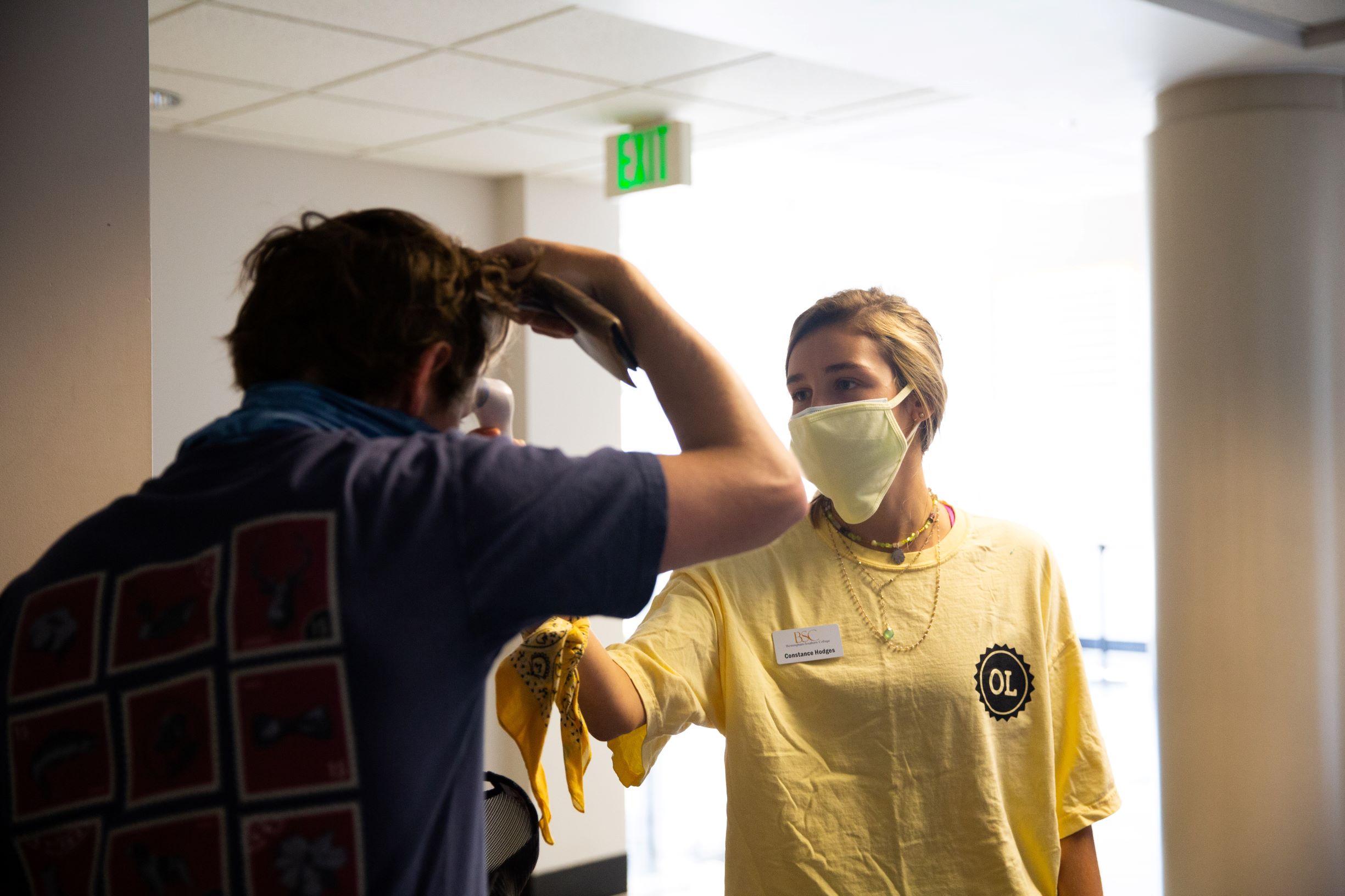
In late March 2020, BSC students received a postcard in the mail with an image of a chalkboard and the words “1st Day of BSC Online.” Students took selfies with the “signs” – some on their front porches as if they were on their way somewhere, others in their bedrooms next to their laptops – and shared them on Instagram. It was the first day in a long series of days that have often been referred to as “unprecedented.”
The postcard offered an encouraging message that BSC would continue to provide the things at its foundation: the exchange of ideas, the sharing of wisdom, the support and understanding of faculty and staff, and the challenges and rewards of learning.
Rising to the Challenge
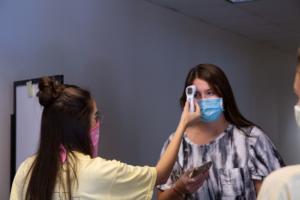
Temperature checks are essential, now that students are back on campus.
When students were sent home on March 16, the transition to online coursework began immediately. Dr. Kate Hayden, assistant professor of chemistry, and Dr. Amber Wagner, assistant professor of creative and applied computing, collaborated with BSC’s IT department to provide training and resources for faculty. Hayden and Wagner led a series of workshops on March 18 – nearly 50 faculty members attended them in groups of ten or fewer, while others viewed a recorded presentation from home. They learned how tools like Moodle, Microsoft Teams, and Screencast-O-Matic would be vital going forward.
Other campus departments worked swiftly to move their services online, including the Library, Counseling Services, the Academic Resource Center, and the Writing Center.
As everyone prepared to return virtually after spring break, Hayden said, “Our mantra has been ‘While we are working remotely, none of us is working alone.’ I hope that is a message that resonates with our students as well.”
A Pandemic Plan
Like other professors, BSC President Daniel B. Coleman spent significant time filming his spring term lectures and meeting with students online. As president, he and senior leadership focused on the immediate administrative needs of the College, including rebating a portion of room, board, and fees of spring term.
He and members of the leadership team secured funding under the CARES Act and the Small Business Administration loan program as well as the U.S. Department of Education grants.
The next step: Exploring what campus life might look like in the fall. Could students, faculty, and staff safely return to the Hilltop?
Six working groups were created to examine every aspect of Birmingham-Southern life: Health Guidelines, Student Life, Academic Affairs, Human Resources, Athletics, and Finance and Operations. Each working group created new processes and protocols to mitigate risk in their focused fields as well as for the greater BSC community. These protocols were shared with seven medical experts around the country – five of whom are BSC graduates – with expertise in epidemiology, oncology, clinical pathology, infectious diseases, public health, and primary care services. The protocols formed the backbone of the Return to the Hilltop plan, shared with students, families, faculty, and staff in a series of online town hall events over the summer.
Fall term on the Hilltop would move forward with 258 (64%) courses offered in person, 25 courses offered online only, and 64 hybrid courses.
Preparing for the Return
Before returning to campus in August, students were tested twice, viewed training videos, began participating in a daily symptom check, and signed a Panther Pledge, a commitment much like the Honor Code to follow the rules and make every effort to keep campus safe and healthy during this unusual time.
BSC partnered with Cahaba Medical Care, which now has an on-campus clinic that provides on-demand testing and COVID-19 care. Throughout the fall term, Cahaba Medical randomly tested students each week, while UAB’s GuideSafe program also provided weekly sentinel testing for faculty, staff, and students. The weekly positivity rate – tracked with an online dashboard – was used to determine guidelines for gatherings and visitors.
…
…
Stocking up on school supplies had a whole new meaning in 2020. Tim Wilding, manager of purchasing, says preparing for students, faculty, and staff to return to campus was challenging, to say the least.
“Supply chains were in shambles this summer, and price gouging and black market-like conditions were the norm,” he said. “When I started hunting for reliable, restockable items to put on campus, it was like the Wild West of procurement. I’ve never seen anything like it. Lysol spray is still almost nonexistent.”
But Wilding says BSC lucked out: “We got what we ordered within six weeks.”
The Realities of Quarantine
“The last protocol we focused on was quarantining,” Coleman says. “While we knew this protocol is critical to preventing the virus from spreading, we, like many others, believed that after a few days, a negative test would allow one to leave quarantine.”
Unfortunately, a conversation with the Jefferson County Department of Health made clear that exposure to the virus meant 14 days of quarantine with no exceptions.
“As soon as we made this our protocol, we knew that we would have two problems,” Coleman says. “There was no way we would not have to quarantine a lot of students, and this would mean we might run out of space.”
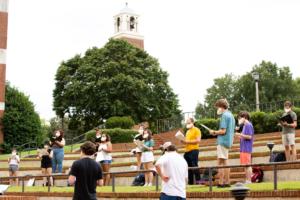
Choir students now have special masks for singing so they can continue to perform.
Students who were isolated still needed access to classes, meaning faculty had to teach students in person and in quarantine at the same time. BSC faculty tackled this challenge with swift determination. One professor put a laptop with a webcam in the front row, treating the quarantined student as another student in the class. Many recorded their classes, making it easier for quarantined students to catch up.
But with isolation and quarantine numbers in the first few weeks exceeding spare bed capacity, fast action was needed. With a grant from the state of Alabama, BSC’s operations team – led by director Randy Johnson – renovated 31 rooms in Hanson Hall in seven days, thanks to round-the-clock tag teams of painters, carpenters, flooring installers, and plumbers. The full renovation of 80 rooms was completed over the following three weeks.
Campus Life
As protocols were enacted and having a cotton swab swirled up one’s nose became all too familiar, departments across campus worked to keep the BSC experience alive and well.
Hand sanitizer stands and signs to direct traffic flow and social distancing popped up across campus. To improve and control air quality, air ionization technology was added in classroom buildings, the Library, Norton Student Center, Striplin Fitness and Recreation Center, Bill Battle Coliseum, and the Student Services building.
“Research indicated that coronavirus might float in tiny aerosols for long periods of time in the air,” says Lane Estes, Vice President for Administration and Interim Chief Financial Officer. “While there was no firm data at the time, we decided it was worth it to add the air purification technology and possibly minimize the risk of this virus and others spreading through the air. The air is cleaner and more pleasant to breathe.”
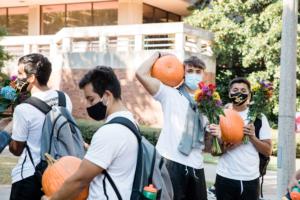
During SGA’s Wellness Week, students enjoyed a fall farmer’s market on campus with pumpkins, flowers, and local vendors.
The music department ordered specially-made singing masks for the choir. Sororities and fraternities held virtual recruitment. Student Development offered opportunities to gather for outdoor activities: a fall festival with a petting zoo and a mechanical bull; an ice cream truck; the Heavenly Donut truck: a “scream it out” moment on the academic quad. On what would have been Homecoming weekend, a “Friday at the Fountain” cupcake party celebrated the 40th birthday of Rowdy the Panther. For Halloween, student organizations decorated car trunks for a drive-through “trunk or treat.”
The SGA sponsored free virtual fitness classes led by Markia Robinson ’16 on Instagram; kickboxing classes were offered over Zoom. Dr. Katie McIntyre offered yoga classes on the quad.
In October, NBC affiliate WVTM 13 visited campus to interview students about college life during a pandemic. Junior Laura Alice Hillhouse of Florence, Ala., says, “Every single week you don’t know what’s promised for the next. I feel a lot of mixed emotions because things are different, but ultimately so grateful that we are here and able to experience this year together.”
Sophomore Sloan Miles of Memphis told WVTM 13, “The factor of enjoying school life hasn’t gone down. When we look back on it we’ll be able to prove to a lot of people that we were one of the few schools in the nation to actually pull this off.”
For more information about BSC’s ongoing response to COVID-19, visit bsc.edu/covid19.
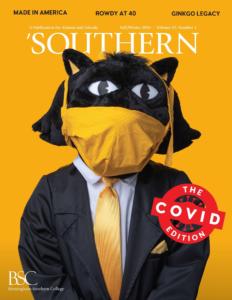 This story was published in the Fall/Winter 2020 issue of ’Southern, BSC’s alumni magazine.
This story was published in the Fall/Winter 2020 issue of ’Southern, BSC’s alumni magazine.
If you have ideas for our next issue of ’Southern, please email [email protected]. We always welcome stories about outstanding people from the BSC community.
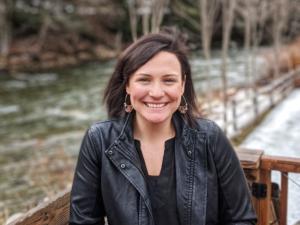
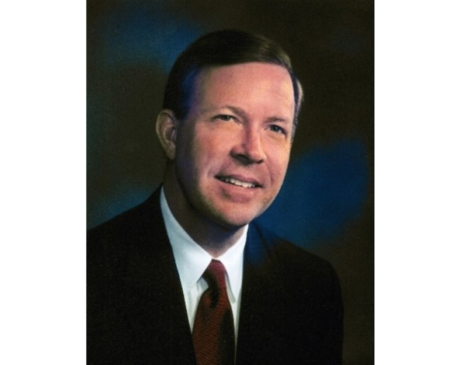

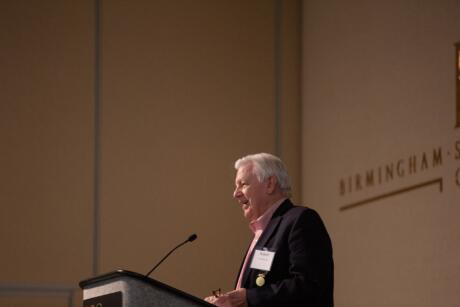
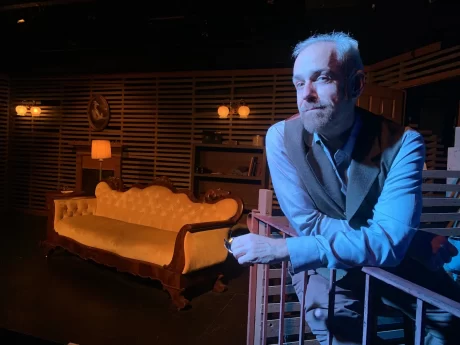
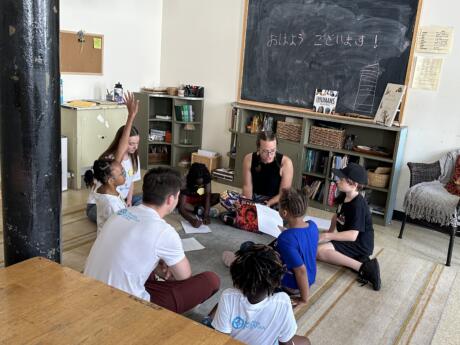
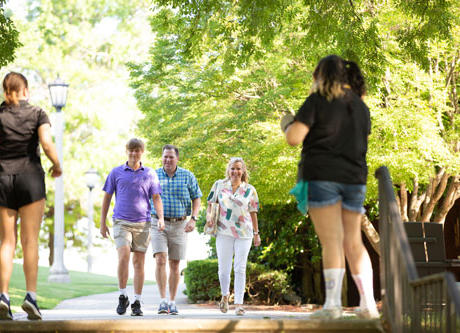
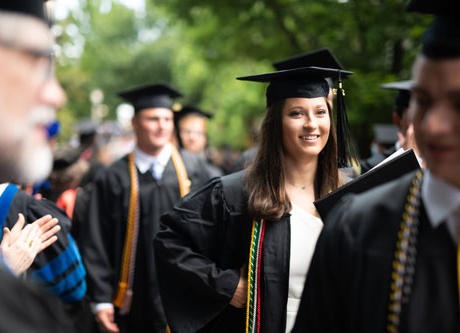
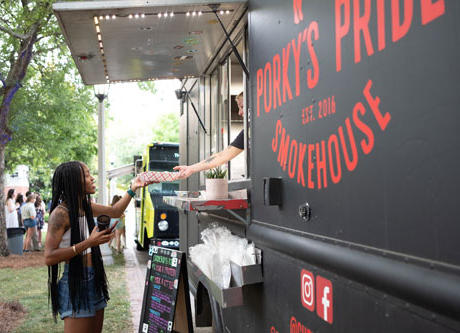
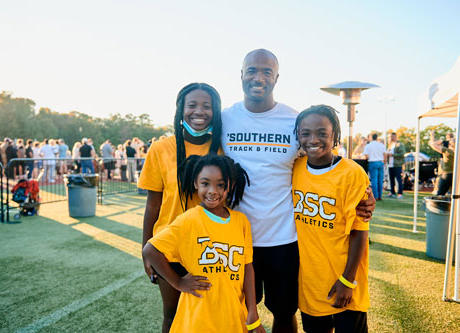
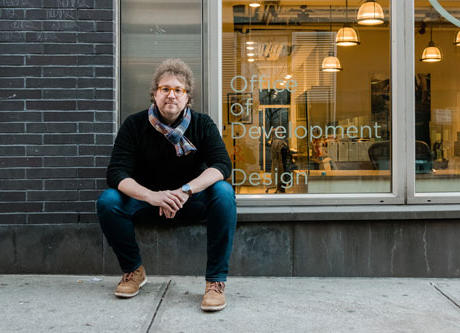
// Comments are closed //